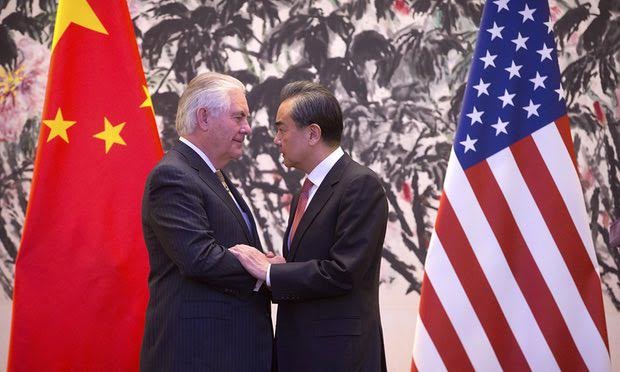Beijing – The United States and China vowed to work together against threats of the North Korea’s nuclear program, while US Secretary of State Rex Tillerson warned that the situation has reached a “dangerous” level.
Tillerson and his Chinese counterpart’s language seemed more reconciliatory in light US President Donald Trump’s accusations that China was not exerting enough efforts to control its troublesome neighbor. Beijing had meanwhile accused the White House of causing tensions.
“I think we share a common view and a sense that tensions on the peninsula are quite high right now and things have reached a rather dangerous level. And we have committed ourselves to doing everything we can to prevent any kind of conflict from breaking out,” Tillerson added during a press conference in Beijing with Foreign Minister Wang Yi.
Tillerson’s visit to China is the last leg of his Asian trip, where he made stops in Japan and South Korea.
He avoided using strong language during the joint press conference with Wang, who seemed to have reproached his counterpart for statements he had made earlier this week.
Wang urged the US to remain “cool-headed” and defended his government’s position, saying all international parties should seek diplomatic solutions while implementing UN sanctions against the regime in North Korea.
“We hope that all parties, including our friends from the United States, could size up the situation in a cool-headed and comprehensive fashion and arrive at a wise decision,” he added.
Neither parties announced any tangible future steps to solve the issue and Tillerson did not publically respond to Beijing’s calls for negotiations with North Korea.
Trump had increased the pressure on China, accusing it of not exploiting all means possible to control North Korea, whom he said considered Beijing to be its closest ally and economic benefactor.
“North Korea is behaving very badly. They have been ‘playing’ the United States for years. China has done little to help!” he tweeted.
The developments come after North Korea conducted two nuclear tests last year and launched missiles last month. The US considered the test-launch an attack on its bases in Japan.
The developments alarmed South Korea, spurring it to deploy the US’s Terminal High Altitude Area Defense System (THAAD). The Chinese leadership had accused the US of aggravating the situation through military trainings with its ally Seoul and the deployment of THAAD.
China is hesitant to increase its pressure on North Korea, whose reactions can be unpredictable.
Washington and Seoul insist that the THAAD system is for defense purposes only, but Beijing fears it could undermine its capabilities to denuclearize North Korea.
Beijing had always called for diplomatic talks to denuclearize North Korea, which is barred by the UN from proceeding with its program.
Wang also said that the Korean peninsula nuclear issue is of interest to everyone, reiterating his country’s commitment to the goal of denuclearization
“We are for the settlement of this issue through dialogue and negotiations and the maintenance of peace and stability on the peninsula and the overall region,” he added on Saturday.
Wang reiterated that China, as a close neighbor of the peninsula and a major power, has devoted a lot of energy and efforts to seek a settlement to the issue. The tremendous important efforts China has made are visible to all, he said.
Tillerson, who was CEO of ExxonMobil before being appointed secretary of state, said that a military option is possible if Pyongyang intensified its work.
“We do believe that if North Korea stands down on this nuclear program, that is their quickest means to begin to develop their economy and to become a vibrant economy for the North Korean people,” the US officials said.
He added: “All options are on the table, but we cannot predict the future.”
Maybe one of the reasons for the calm American-Chinese rhetoric is the expected talks between US President Trump and Chinese President Xi during the latter’s upcoming visit to US next month, the first such summit between the two leaders.
Trump is expected to host Xi at his Mar-a-Lago resort in Palm Beach on April 6 and 7 for an informal “no necktie” encounter. Experts hope this meeting will reduce tensions between the two officials.
China shares US fears of Pyongyang’s nuclear ambition, but it makes sure not to provoke its neighbor.
In February, Beijing issued a strong position when it announced it will stop coal imports from North Korea until the end of this year.
North Korea expert at Beijing University Wong Dong said: “It is a mistake to think that China can control Pyongyang and it is not reasonable for Washington to accuse Beijing of doing nothing. The situation is complicated and sensitive and there is no magical solution.”
The Obama administration ruled out any diplomatic involvement with Pyongyang until the latter shows commitment to denuclearization.
The communist state insists on owning nuclear weapons to defend itself and executed its first test in 2006 despite international objection. It had done four other tests, two last year.
